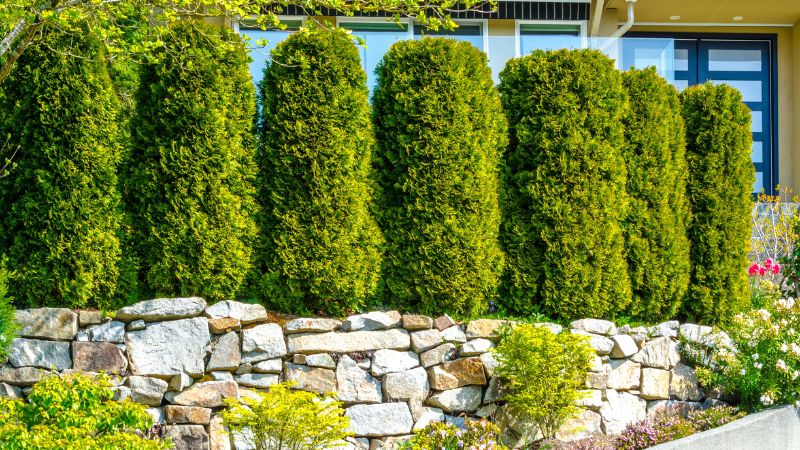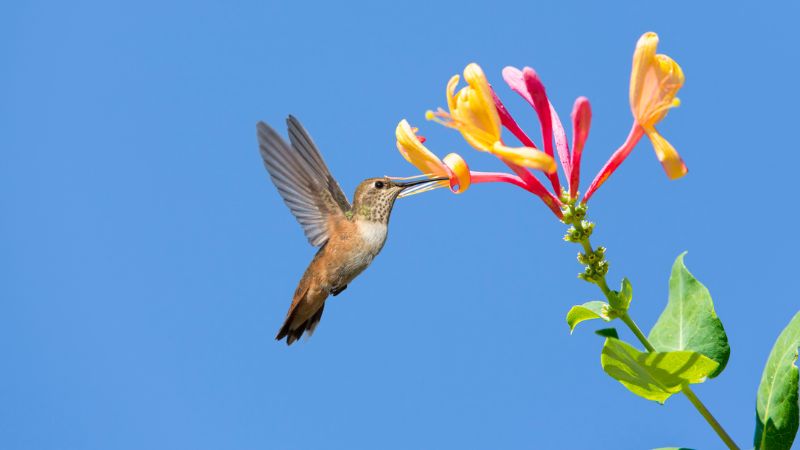Creating a private sanctuary in your yard is a cherished aspiration for many homeowners. The key to achieving this lies in selecting the right trees for privacy screening. In this guide, we delve into the realm of rapidly-growing trees tailored for this purpose. From the majestic Leyland Cypress to the elegant Italian Cypress, we explore a diverse range of options to suit various preferences and landscapes. Discover the beauty of lush foliage, the allure of rapid growth, and the tranquility of secluded spaces as we embark on this journey to transform your yard into a serene oasis. Join us as we navigate the world of privacy screen trees, where nature and privacy converge seamlessly.
1. Leyland Cypress (Cupressus × leylandii)
The Leyland Cypress stands out for its exceptional growth rate and dense evergreen foliage, making it a preferred choice for privacy screens. This tree can surge upwards at a remarkable pace, growing up to 3 feet per year under optimal conditions. With a potential height exceeding 60 feet, it provides ample coverage for privacy needs. Thriving best in full sunlight and well-drained soil, the Leyland Cypress showcases its vigor in favorable environments, ensuring a robust and flourishing presence in your landscape.
2. Thuja Green Giant (Thuja standishii × plicata)
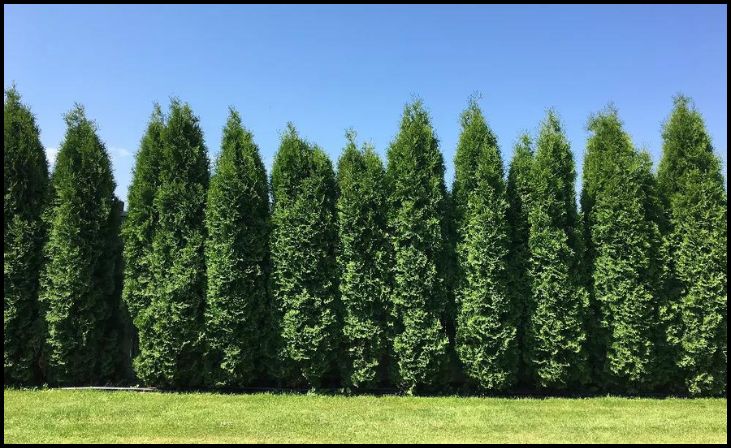
The Thuja Green Giant boasts rapid growth, soft foliage, and a distinctive pyramid-like shape, making it highly sought after for privacy screening. With a growth rate comparable to the Leyland Cypress, it can reach impressive heights of 30 to 40 feet within a few years. This tree’s low-maintenance nature and tolerance to various soil types further enhance its appeal, offering homeowners an easy-to-care-for yet effective solution for creating privacy in their yards.
3. Emerald Green Arborvitae (Thuja occidentalis ‘Smaragd’)
Renowned for its vibrant green foliage and slender, compact form, the Emerald Green Arborvitae presents an attractive option for privacy screening, particularly in smaller yards or along property lines. While it grows at a moderate pace compared to some other species, reaching heights of 10 to 15 feet, its dense growth habit ensures ample coverage. Its visual appeal is heightened by the glossy evergreen leaves, adding a touch of elegance to any landscape.
4. Nellie Stevens Holly (Ilex ‘Nellie R. Stevens’)
The Nellie Stevens Holly earns acclaim for its glossy evergreen leaves and dense growth habit, making it a favored choice for privacy screens. Growing at a moderate rate, this tree can attain heights of 15 to 25 feet, providing a substantial barrier for privacy needs. Additionally, its production of red berries in the fall not only adds visual interest but also attracts wildlife, enriching the biodiversity of your yard.
5. Eastern Red Cedar (Juniperus virginiana)
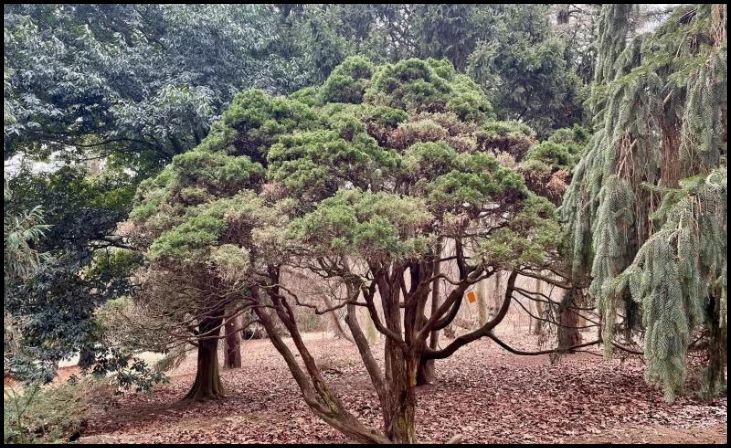
Appreciated for its conical shape, aromatic foliage, and adaptability to various soil conditions, the Eastern Red Cedar is a popular selection for privacy screening. Growing at a moderate pace, reaching heights of 40 to 50 feet, this tree offers year-round privacy while also attracting wildlife, contributing to a thriving ecosystem in your yard. Its resilience and aesthetic appeal make it a valuable addition to any landscape seeking privacy and beauty in equal measure.
6. Green Giant Arborvitae (Thuja plicata ‘Green Giant’)
The Green Giant Arborvitae is renowned for its rapid growth and vibrant green foliage, making it an ideal choice for larger properties and windbreaks. Growing up to 3 feet per year and towering at heights of 50 to 60 feet, this tree offers swift and substantial privacy screening. Its dense foliage provides ample coverage, while its vigorous growth ensures a lush and verdant landscape in a relatively short time frame.
7. Italian Cypress (Cupressus sempervirens)
Known for its tall, slender profile and rich green foliage, the Italian Cypress adds an element of elegance to any landscape. Growing at a moderate pace, reaching heights of 40 to 60 feet, this tree offers privacy screening with a touch of sophistication. Its distinctive silhouette and evergreen foliage make it a standout feature in any yard, enhancing both privacy and aesthetic appeal.
8. American Arborvitae (Thuja occidentalis)
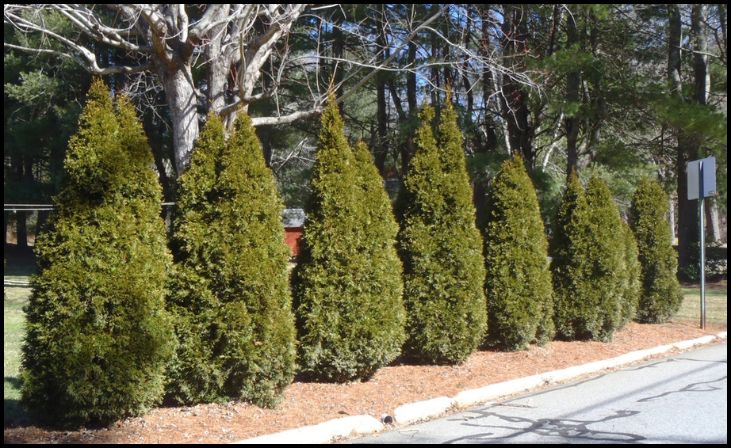
Prized for its columnar shape and vibrant green foliage, the American Arborvitae is a versatile choice for both formal and informal landscapes. Growing at a moderate rate, reaching heights of 10 to 20 feet, this tree provides effective privacy screening without overwhelming smaller yards. Its dense foliage and compact form make it an excellent option for creating natural barriers or defining boundaries in any outdoor space.
9. Cryptomeria (Cryptomeria japonica)
Also known as Japanese Cedar, the Cryptomeria offers soft, feathery foliage and a conical shape, adding a touch of exotic beauty to any yard. Growing at a moderate pace, reaching heights of 40 to 50 feet, this tree provides privacy screening with a unique aesthetic appeal. Its distinctive foliage texture and graceful form make it a captivating addition to any landscape, elevating the visual interest while ensuring ample seclusion for outdoor living spaces.
Conclusion
In conclusion, the selection of privacy screen trees is pivotal in curating a tranquil haven within your yard. Each tree, from the swift-growing Leyland Cypress to the stately Italian Cypress, offers unique attributes to enhance privacy and beauty. By considering factors such as growth rate, foliage density, and maintenance requirements, homeowners can tailor their landscape to suit their preferences and needs. Whether you seek rapid growth, elegant silhouettes, or year-round greenery, there is a privacy screen tree to fulfill your vision. Embrace the transformative power of nature and embark on a journey to create an idyllic retreat in your outdoor space. Invest in these verdant companions and relish the serenity they bring to your sanctuary, ensuring years of enjoyment and seclusion amidst the beauty of nature.

